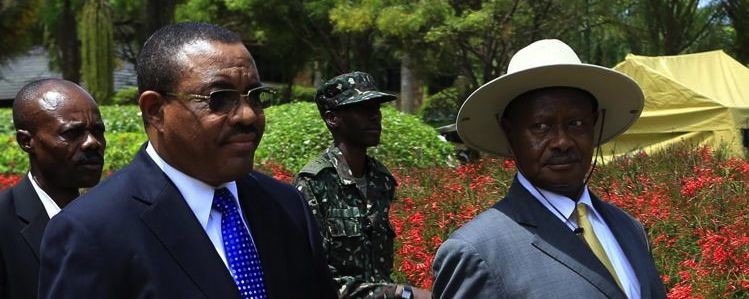Leaders of the East African nations belonging to the regional bloc the Inter-Governmental Authority on Development (IGAD) are expected to meet within days to consider ‘punitive measures’ against the warring parties in South Sudan.
Ethiopian Prime Minister Hailemariam Desalegn last week explained that East African leaders at the upcoming meeting would “take strong action” against the warring parties, which include Salva Kiir’s SPLM/A-Juba faction and his rival Riek Machar’s SPLM/A-in-Opposition.
Speaking at a press conference on 5 August in Washington, Hailemariam said that IGAD has prepared a “proposal” for the establishment of a transitional government of national unity in South Sudan.
If this proposal is rejected, then “punitive action” will follow, he said.
“If the parties do not agree on the proposal that the region has put in place… then the region is going to take strong action, as we have put in the IGAD summit – punitive action that has to be taken immediately after convening the meeting of IGAD heads of state and government in Addis Ababa very soon after this summit,” Hailemariam said.
Radio Tamazuj is not informed of exact dates of the upcoming summit meeting of IGAD Heads of State and Government. However, South Sudanese presidential spokesman Ateny Wek said that Salva Kiir will be heading to Ethiopia this weekend to attend the meeting.
Meanwhile, representatives of the leader of the SPLM/A-IO faction, Riek Machar, are yet to confirm whether he has been invited to attend the upcoming summit meeting in Ethiopia.
Delegations in Addis Ababa
The IGAD-facilitated peace process continued in Addis Ababa yesterday, one day after the expiry of the IGAD deadline for formation of a transitional government.
The former justice minister and member of the SPLM Former Detainees group told Radio Tamazuj that the parties sat together again on Monday to hear presentations by experts on various issues related to conflict resolution.
Since the weekend the delegations have been hearing from various ‘resource persons’ on such issues as security arrangements, constitutional law, and economic affairs. After the expert presentations, the parties are able to discuss the issues.
At the same time, the former justice minister said, “Still the real negotiation has not started yet.” For instance, the parties have not yet negotiated the term of the mandate of the transitional government.
He said that the position of his own group is that the transitional period should not be more than two to three years. Other related issues such as the structure and composition of the transitional government have likewise not yet been negotiated.
It is also not yet clear when the parties will be given the opportunity to study the IGAD proposal described by Prime Minister Hailemariam Desalegn, if at all.
Recent remarks made by negotiators of the SPLM-Juba and SPLM-IO factions indicate that the two sides are still pushing for direct negotiations that would exclude the SPLM Former Detainees and other delegations such as civil society.
The IGAD mediators may adjourn the talks again rather than accept this, since they have been insisting on a “multi-stakeholder roundtable format,” and would potentially decline to facilitate discussion on the transitional unity government in any other format.
The only exception would be direct talks on security issues, in which the other parties already accepted they should not be involved. Radio Tamazuj was yesterday unable to reach the government delegation member Yai Joseph for comment on the security talks that he had announced would take place on Monday.
Meanwhile, Eye Radio in Juba reported yesterday that the government delegation chief negotiator, Nhial Deng Nhial, is returning to Juba for consultations with the president on the progress of peace talks in Addis Ababa.
The radio station also quoted the Minister of Information, Michael Makuei Lueth, as saying that the talks would be suspended today (Tuesday) due to the visit of a UN Security Council delegation to Juba. However, John Luk denied this, saying the mediators have already set an agenda for today, with expert presentations continuing.
The spokesman of the IGAD mediation could not be reached for comment on these claims.
‘Troika’ countries urge punitive measures
Norway, the United States and the United Kingdom issued statements yesterday and the previous day urging East African countries to take action against the warring parties in South Sudan.
Ethiopia’s prime minister has previously declined to comment on what these measures might be. Sanctions by the European Union and United States included asset freezes and travel bans against targeted individuals.
US Secretary of State John Kerry stated yesterday, “Deadlines keep passing and innocent people keep dying… neither party engaged in peace talks seriously.”
“Regional leaders have previously called for punitive measures if the parties failed to secure peace by the agreed deadline. I call on IGAD and the African Union to immediately take appropriate action to bring peace to the people of South Sudan.”
Kerry’s statement came a day after the issuance of a nearly identical statement by Borge Brende, Foreign Minister of Norway. The British also yesterday come out with a statement to the same effect.
File photo: Uganda’s President Yoweri Museveni (R) and Ethiopian Prime Minister Hailemariam Desalegn at an IGAD meeting in Kampala, 27 March 2014 (Reuters/James Akena)
Related coverage:
South Sudan negotiators fail to meet IGAD deadline (11 Aug.)
Factbox: The IGAD negotiators (29 June)




